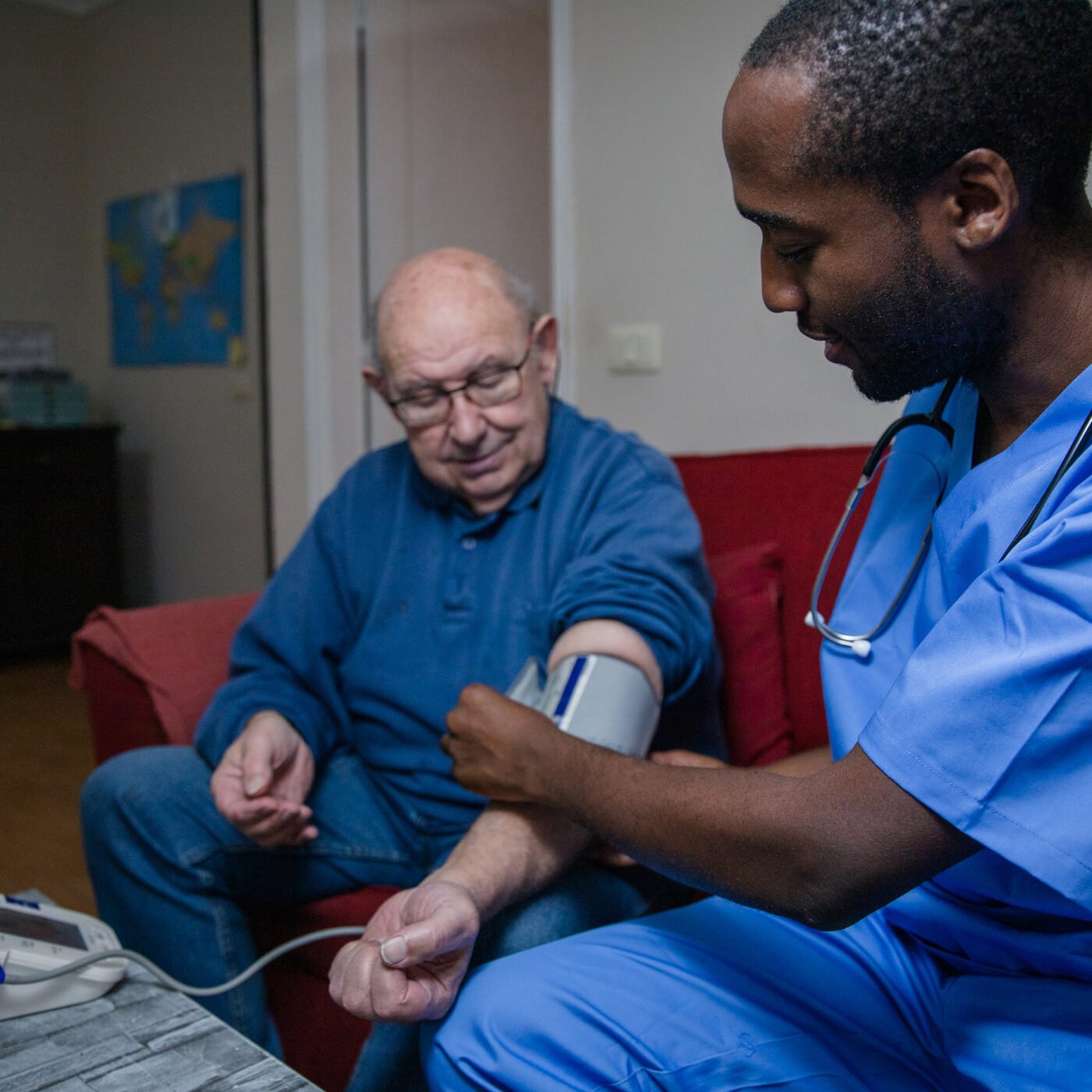Hypertension care – caring for a loved one with hypertension at home
Tags
Complex Care
Hypertension, also know as high blood pressure is a common condition is older adults. It can put a strain on blood vessels and organs in the body, and may lead to serous health conditions, such as cardiovascular disease. Luckily, many people can manage their blood pressure at home with the right care and by making healthy lifestyle choices. In this article, we’ll look at some of the ways older people can keep their blood pressure in check, and the type of support that’s available.
What is hypertension?
Hypertension, HBP or high blood pressure and is a common but serious condition diagnosed in many older adults. It is not something you’ll normally feel or notice, which is why older people are likely to have their blood pressure checked during a GP visit or hospital appointment.
The NHS explains that blood pressure is recorded with two numbers – the systolic pressure (the larger number) tells you the force at which your heart is pumping blood around the body. The diastolic pressure (smaller number) tells you the pressure in your blood vessels when your heart rests between beats.
Normal blood pressure is usually considered to be in the range of 90/60mmHg and 120/80mmHg. For people over the age of 80, the ideal is below 150/90mmHg.
However, it’s important to know that everyone’s blood pressure is different – so what might be an average blood pressure for you, might be considered too low or high for someone else.
Did you know –
- It’s estimated that hypertension affects one out of three adults in the UK.
- Half of those haven’t been formally diagnosed, or aren’t receiving treatment
- High blood pressure accounts for 12% of all GP appointments in England alone.
Why is it so important to manage hypertension?
Hypertension care is vital, and if left unmanaged, it can significantly raise the risk of a range of different conditions, some of which can be extremely serious. The British Heart Foundation state that when left untreated, our normally stretchy blood vessels lose their stretchiness, causing the blood vessel walls to become narrow. This narrowing can cause fatty deposits to build up and lead to complications such as –
- Heart attacks
- Heart failure
- Vascular dementia
- Stroke
- Vision loss
- Kidney failure or kidney disease
While the complications can be incredibly serious, hypertension is actually one of the most preventable and treatable health conditions, and can often be managed at home with medication and some lifestyle modifications.
How best to manage hypertension at home
There are lots of small changes you can make to daily life to manage high blood pressure at home. However, change can be tricky, and if you’re supporting a loved one it’s important not to overwhelm them with too many instructions or requests all at once. Instead, perhaps look for areas where you can make smaller changes – such as walking to the local shop for the daily paper rather than taking the car, or choosing not to put the salt shaker out on the table at meal times – before gradually introducing more.
Reduce salt intake
If we eat too much salt (sodium)water can be pulled back into our bloodstream, and more water in our blood vessels means more vascular pressure. While it can be a fairly minimal change to cut down on salt when cooking, according to the British Heart Foundation, 75 percent of the salt we eat is added before before we even bring it home from the supermarkets, so it’s really important to check food labels thoroughly.
Some foods may contain more salt than expected too. For example cheese, condiments and sauces, and some bread can all increase our sodium intake.
Maintain a healthy diet
Salt isn’t the only thing to be mindful of when choosing what to eat. A well-balanced diet can support better heart health. While lots of websites and healthy eating books may outline the benefits of specific vitamins and minerals, a diet rich in heart-healthy foods is often easiest when you think about your diet as a whole and eating the right amount of food to give your body what it needs.
This is why the NHS and British Heart Foundation recommend using the EatWell plate as a guide when making healthy choices. It can help you understand the right balance of protein (e.g beans, meat, fish), starchy carbohydrates (e.g potatoes, rice, pasta), dairy (e.g eggs, milk) and fruit and vegetables.
Reduce alcohol intake
Alcohol can be a big risk factor for many chronic conditions, and doctors have made a clear link between alcohol and hypertension. The UK Chief Medical Officers state that no adult should drink more than 14 units of alcohol a week.
Get active
The British Heart foundation recommends doing some form of moderate exercise everyday, In 10+ minute bouts, for a total of around 150 minutes a week. Moderate exercise may include something like aerobic exercise, brisk walking or swimming.
if you or your loved one is less mobile, don’t worry, there are other ways to get active.
Exercise doesn’t have to mean anything too straining. You can increase your activity levels simply by walking, or through seated exercises – the important thing is to get the body moving. Even daily tasks like shopping, dusting, or sweeping the floor can all count as physical activity.
Combined with a healthy diet, regular exercise can help us maintain a healthy weight – which can also help keep blood pressure at a normal or safe level.
Regular blood pressure monitoring
You may be advised by your GP or healthcare professional to check your blood pressure at home with an at home machine.
Choosing a reliable blood pressure monitor is key. If your doctor doesn’t provide one, The British Heart Foundation has a lot of different options available and can be a good place to start your search. Your blood pressure machine should be approved for use in the UK, and it’s recommended to get it serviced every two years.
Taking your blood pressure needs to be done under the right conditions for an accurate reading. If you’re stressed, slouching, or talking this could effect the reading.
You may find it helpful to record your blood pressure readings in a notebook, along with the date, to make it easy to keep track.
If you are instead getting your blood pressure checked by a professional, Set reminders for when this is due and arrange travel to the GP or pharmacy ahead of time.
Ensure medication is taken properly
if you or a loved one is taking blood pressure medication, it’s likely this medicine will need to be taken for the rest of your life. Remembering to take this medication at the right time of day, at the right dose, consistently is really key. You may wish to use a dosette box to organise your medication – some also feature alerts to remind you when it’s time to take it.
Plus setting up a repeat prescription at your local pharmacy (ask your GP about repeat dispensing), or arranging a delivery of it to your home is often a good idea too, so you can ensure you never run low.
Give up smoking
Nicotine temporarily increases the heart rate, which then raises blood pressure. It can also cause the arteries to tighten and so it is crucial to quit, or encourage loved ones to give up. The NHS offers lots of smoke free resources and guidance. They may also be able to provide certain treatments for quitting more affordable.
Manage stress
Keeping stress levels low can help maintain a healthy blood pressure level. Relaxation techniques can help with this or even a hobby such as painting or completing puzzles.

How can you or a carer support someone with high blood pressure?
- Start the conversation. Ask questions to understand where they may like your help. For example,
- What do you find most difficult about controlling your blood pressure?
- Do you have any goals or things you’d like to do in mind that will help?
- What can I do to help you?
- Be positive. Remind them that it’s not a race, and even the smallest change is a step in the right direction.
- Help them create a comfortable routine. One that ensures they remember to take their medication, and help them plan for and attend medical appointments
- Go food shopping together. Help them to read packaging and make healthy choices.
- Meal plan. Work together to create weekly menus that they’ll enjoy. Think about their cooking ability, and where you may need to help them prepare certain meals.
- Encourage movement. This could mean going for a gentle walk in a park for a chat, rather than sitting in a cafe with a coffee.
This article is for informational purposes only and not to be taken as medical advice. For medical advice, always consult your GP.
Learn more about complex care
Take a look at more Elder guides on how to support those living with complex conditions below.

Can I arrange nursing care at home?
Nursing care is provides care and treatment to people with complex medical conditions, but is it possible to receive it at home? We take

Living well with diabetes in later life
It’s estimated that over a third of people with diabetes in the UK are over 65 years of age. That’s around 1.5 million people.

Caring for different types of hearing loss
According to Age UK, hearing loss affects around 12 million adults in the UK. People with hearing loss may not always require specialist care

Vision loss in older people – Is there a cure, and how can it be cared for?
Vision Loss Care: Is There a Cure? Your loved one may develop signs of vision loss as they grow older. However, there are ways

Motor neurone care: How do I care for a loved one with motor neurone disease?
Motor Neurone care: How do I care for a loved one with Motor Neurone Disease? A diagnosis of Motor Neurone Disease, commonly referred to

Arthritis in the elderly – causes and care options
Arthritis Care: What Causes Arthritis in the Elderly? Arthritis, which causes painful and inflamed joints, can affect anyone at any age. However, we